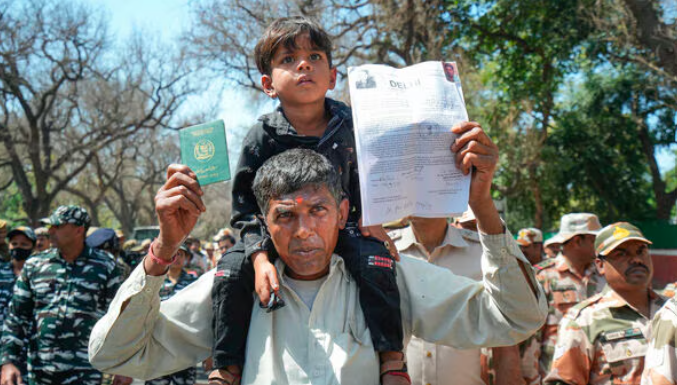Citizenship (Amendment) Rules : In a significant development, the Union home ministry announced the issuance of the first set of citizenship certificates under the new Citizenship (Amendment) Rules (CAA). Union Home Secretary Ajay Kumar Bhalla personally handed over citizenship certificates to 14 applicants in Delhi on Wednesday, marking a historic moment in India’s citizenship landscape.
India Issues First Citizenship Certificates under CAA: 14 Granted Indian Nationality

Months after the notification of the Citizenship (Amendment) Rules, this issuance underscores the government’s commitment to address the concerns of persecuted minorities from neighboring countries. The move comes after a rigorous scrutiny process conducted by the Empowered Committee in Delhi, led by the Director of Census Operation.
ALSO READ : Amit Shah Clarifies: PM Modi Won’t Be Replaced After 75 Amidst Arvind Kejriwal’s Speculations
“The Home Secretary congratulated the applicants and highlighted salient features of the Citizenship (Amendment) Rules, 2024,” the ministry stated in a press release, emphasizing the significance of this milestone.
Understanding the Citizenship (Amendment) Rules
The Citizenship (Amendment) Rules, 2024, enacted in December 2019, aim to provide Indian nationality to persecuted non-Muslim migrants from Bangladesh, Pakistan, and Afghanistan who entered India on or before December 31, 2014. This includes individuals from Hindu, Sikh, Jain, Buddhist, Parsi, and Christian communities.
Despite the enactment of the CAA in 2019, the issuance of rules pertaining to Indian citizenship was delayed for over four years. However, on March 11, 2024, India notified the Citizenship (Amendment) Rules, 2024, enabling eligible applicants to apply for citizenship.
“In pursuance of these rules, applications have been received from persons belonging to Hindu, Sikh, Jain, Buddhist, Parsi, and Christian communities from Pakistan, Bangladesh, and Afghanistan who entered India up to 31.12.2014 on account of persecution on grounds of religion or fear of such persecution,” stated the home ministry.
Controversy and Reassurances
The Citizenship (Amendment) Bill, which later became the CAA, faced widespread criticism and protests when it was introduced in 2019. Critics and Muslim groups raised concerns about potential discrimination, fearing that Muslims could face deportation or internment while non-Muslims would be protected under the law.
However, government officials, including Union Home Minister Amit Shah, assured that the CAA would not cause any inconvenience or discrimination. They emphasized that all individuals, regardless of religion, would be treated with respect and dignity.
The issuance of the first set of citizenship certificates represents a crucial step towards fulfilling the government’s commitment to safeguarding the rights of persecuted minorities and upholding India’s secular values. As the process continues, it remains a topic of both debate and hope, reflecting the complexities of India’s citizenship policies and its commitment to inclusivity.
SEE ALSO : Home Minister Amit Shah Rebuts Arvind Kejriwal’s “Amit Shah To Be PM” Claim














